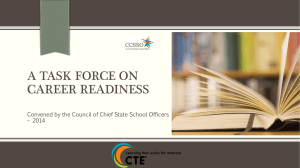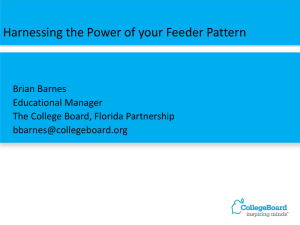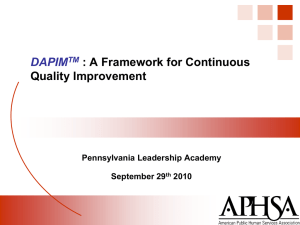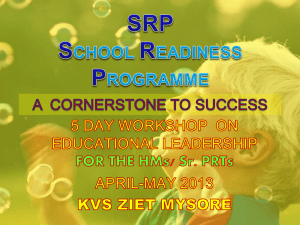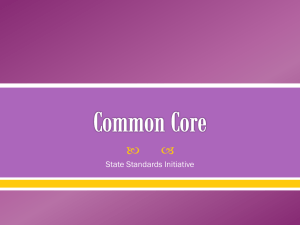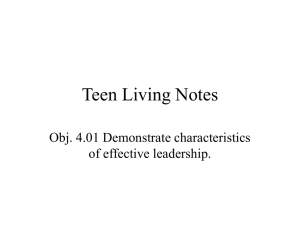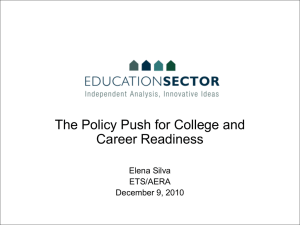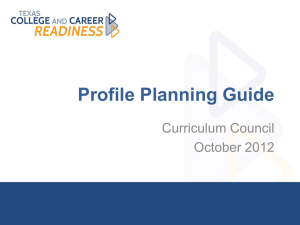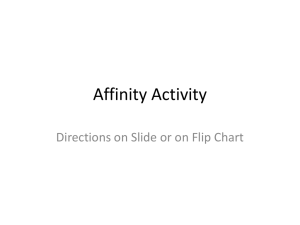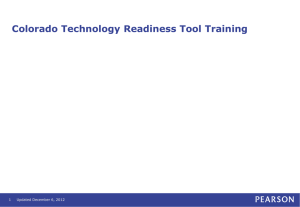Ramp-Up to Readiness TM
advertisement
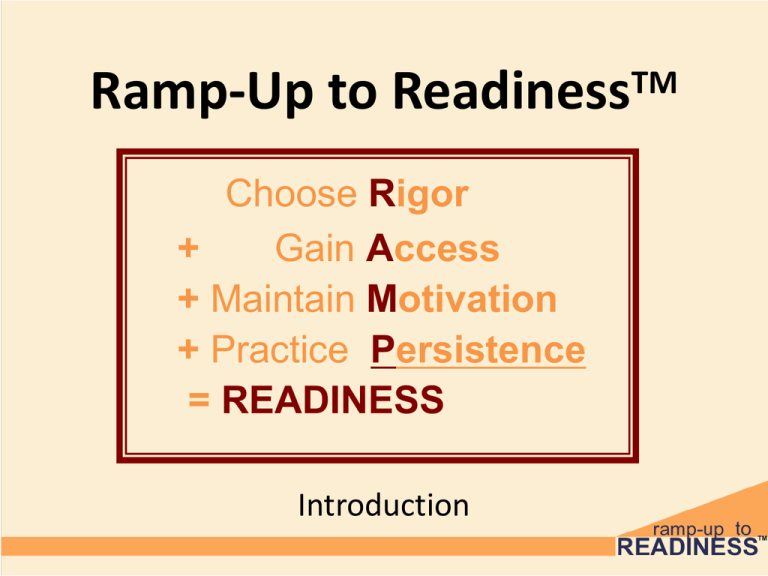
Ramp-Up to Readiness Choose Rigor + Gain Access + Maintain Motivation + Practice Persistence = READINESS Introduction TM Think-Pair-Share • Why did we start talking about college readiness so early in your school career? • What are 3 important things you’ve learned through Ramp-Up to Readiness? Microsoft, 2011 Discuss Microsoft, 2011 • How do you think you would feel if you were just beginning the college preparation process now? • How ready do you feel for college? Objectives • You will learn about the following: Ramp-Up to ReadinessTM What it means to be college ready What you can do in your senior year to prepare for college Review • What is Ramp-Up to Readiness™? – A program to help all students develop the knowledge, skills, and habits for success in postsecondary education (college). Microsoft, 2011 What are the Pillars of Readiness? Goal: All students meet Ramp-Up Standards Pillars of Readiness Plan Foundation: Belief that all students need to be prepared for postsecondary education What Does it Mean to Be Ready? Goal: All students meet Ramp-Up Standards Personal/Social Financial Career Academic Plan Admissions Pillars of Readiness Foundation: Belief that all students need to be prepared for postsecondary education Academic Readiness • Means graduating from high school ready to do first-year, credit-bearing college work. • Some skills include: – Strong reading, writing, and math skills – Analyzing and solving complex problems – Critically evaluating claims Microsoft, 2011 – Asking and investigating important questions – Checking your work to make sure it’s correct Think-Pair-Share • What are some activities or lessons you’ve engaged in to prepare you to be more academically ready for college? Admissions Readiness • Means meeting all of the requirements for admission into the college (2- yr or 4-yr) that you want to attend • Skills: Microsoft, 2011 – Identifying the type of college that best fits your personality, career and personal goals, and strengths – Figuring out the requirements at the colleges you want to attend and coming up with a plan to meet them – Applying to at least 3 colleges that are good matches for you Think-Pair-Share • What are some activities or lessons you’ve engaged in to prepare you to be more admissions ready for college? Career Readiness Means understanding: • The relationship between education and income and opportunity • Which types of jobs will: Microsoft, 2011 – Need skilled workers in the future – Will pay enough to support a family and your desired lifestyle – Be a good match for your interests and abilities. Think-Pair-Share • What are some activities or lessons you’ve engaged in to prepare you to be more career ready for college? Financial Readiness • Means you are able to cover the cost of your 1st semester at college through savings, loans, work-study and financial aid • To be financially ready, you need to: – Know how to budget – Know how families like yours pay for college – Make a plan to pay for college – Apply for financial aid Microsoft, 2011 Think-Pair-Share • What are some activities or lessons you’ve engaged in to prepare you to be more financially ready for college? Personal/Social Readiness • Means you are ready for the personal and social challenges of college. • Important skills include: – Setting educational goals – Monitoring progress toward achieving your goals – Putting your best effort into your schoolwork Microsoft, 2011 – Asking for help when you need it – Creating relationships with peers and adults that support academic success Think-Pair-Share • What are some activities or lessons you’ve engaged in to prepare you to be more personally ad socially ready for college? How Can You Prepare Now? Understand Academic Readiness Financial Readiness Admissions Readiness Career Readiness Plan Believe Act Personal/Social Readiness How Can You Prepare Now? Understand Academic Readiness Financial Readiness Admissions Readiness Career Readiness Plan Believe Act Personal/Social Readiness This Year… • • • • • • • • Set SMART Goals Discuss avoiding the senior slide Learn more about the admissions process Complete college applications Work on financial planning for college Complete the FAFSA Update your resume Learn more about the differences between high school and college • Reflect on your preparation for college Ramp-Up Postsecondary Plan What do I want to do with my life after high school? Ramp-Up Readiness Rubric Am I on track to meet my goals? Why Focus on College Readiness? • What you do now makes a difference in how prepared you will be for college. • The following all impact your college readiness: – – – – Courses you take Grades you earn Test scores Knowledge, skills, and habits you develop now – Your Support Network – Savings and opportunities for financial aid Microsoft, 2011 Think-Pair-Share • Which area of college and career readiness (academic, admissions, career, financial, personal/social) do you feel the most ready in? Why? • Which area of college and career readiness do you think you need to work on the most right now? Review • In Ramp-Up to Readiness, we’ll work together to make sure you are: – Academically Ready – Admissions Ready – Career Ready – Financially Ready – Personally and Socially Ready for college! • Preparing for college now will also ensure you develop the skills, knowledge, and habits you need to succeed in high school. Assignment • Take the Postsecondary Plan and Readiness Rubric forms home and share them with your family! • Explain what you learned about Ramp-Up to Readiness and what you will be doing this year to become college and career ready. • Ask for their help in preparing for college! References • Microsoft Office Images. (2011). Retrieved from http://office.microsoft.com/en-us/images/
